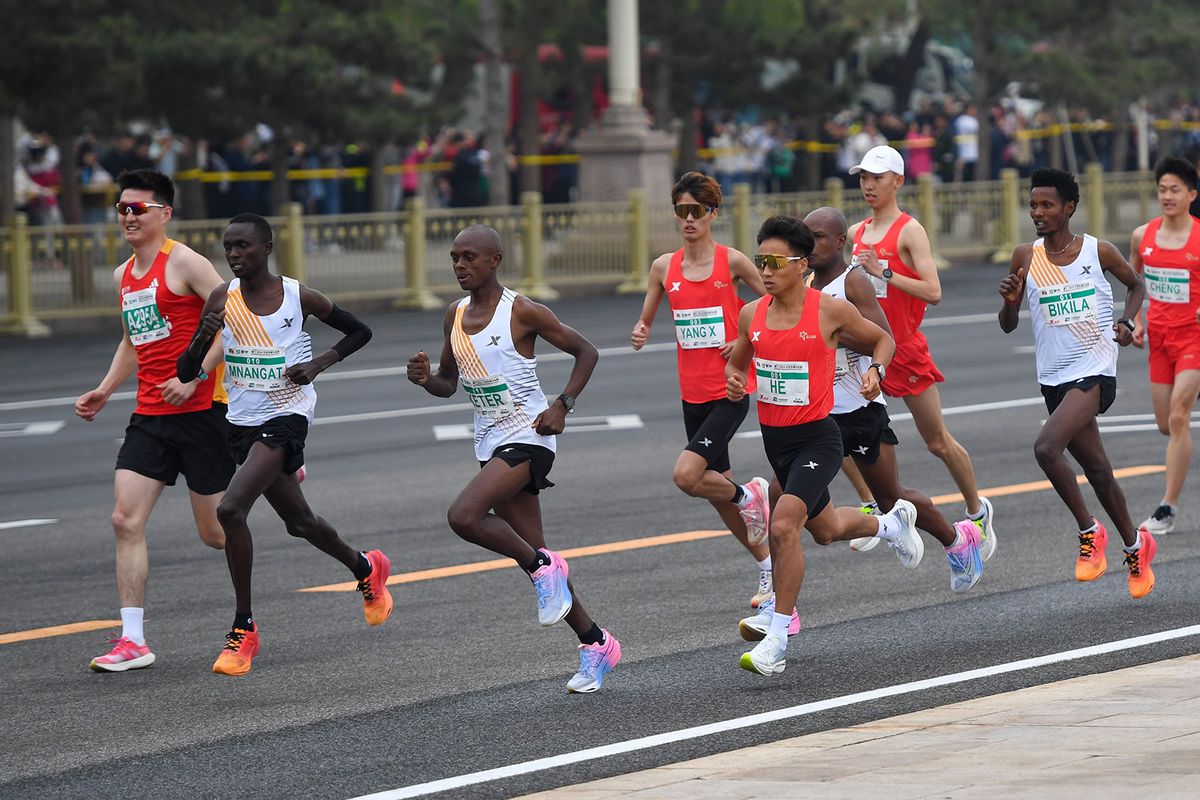Organizers of the Mengnui Beijing Half Marathon have launched a probe to examine a potential cheating scandal after three African runners seemingly slowed down, allowing a Chinese athlete to surge ahead of them and clinch the win.
A recorded live stream of the April 14 race shows that the four runners in question — Willy Mnangat and Robert Keter both of Kenya, Dejene Hailu of Ethiopia and He Jie of China — were largely together throughout the 13.1 miles. But as the group nears the finish line, Mnangat and Keter each appear to gesture to He to move forward, in a seemingly deliberate move that allows him to break the tape first. Video of the race's closing seconds quickly circulated online, leading to widespread skepticism and rumors of potential rigging.
The results are still under review, but here's what we know so far about the controversy.
Who is He Jie?
The 25-year-old athlete won the men's marathon at the Asian Games and is ranked 77th in the world, per World Athletics. Last month, He set a Chinese national record when he ran a 2:06:57 at the Wuxi Marathon, the New York Times reported.
What the video shows
As the quartet approaches the final straightaway, the Kenyan and Ethiopian runners — clad in white and orange singlets — visibly appear to slow their pace, per footage obtained by the Wall Street Journal. Mnangat can be seen waving his hand alongside He, wearing a red racing tank, who then begins to push ahead of the pack. He cuts across the front of the group, from right to left, before Keter demonstrates a similar motion as if to encourage He to keep going. He strides across the finish line in first, followed by the trio of African runners who came in joint second place. He won in a time of 1:03.44, missing the national record by one minute and 11 seconds, as noted by The Guardian.
What the organizers of the race say
The Beijing International Running Festival, which planned the half marathon, shared a statement on Monday indicating that it had initiated the investigation in response to online speculation. The organizing committee attaches great importance to the issue raised by netizens about the results of the (race),” organizers said, per the Associated Press. “A special investigation team has been set up to conduct an investigation, and the results of the investigation will be released to the public in a timely fashion.”
Mnangat changes his story about why he let He win
Right after the race concluded, Mnangat also told the South China Morning Post that he let He win "because he is my friend."
“He comes to Kenya and I was [pacing for him] in the Wuxi Marathon [in March], so he is my friend, OK,” the Kenyan runner added.
However, when speaking to BBC Sport Africa, Mnangat claimed that in the half marathon, all three men had been hired to serve as He's pacemakers, despite entering the race as official competitors. "I don't know why they put my name on my bib/chest number instead of labeling it as a pacemaker," Mnangat told the outlet. “I was not there to compete. My job was to set the pace and help the guy win but unfortunately, he did not achieve the target, which was to break the national record.”
Commonly used in long-distance track events and road races, pacemakers (more colloquially known as "pacers") are experienced runners who run a designated pace per mile to help another runner hit a time goal.
Not the first Chinese distance runner cheating accusations
According to the NYT report, 258 participants in the 2018 Shenzhen Half Marathon were disqualified after it was determined that they had cheated by wearing fake bib numbers, taking shortcuts and hiring other runners to fill in for them, as reported by Chinese state-led media.
In 2019, female runners were caught riding bikes in the Chengdu Women’s Half Marathon and the Xuzhou International Marathon.



Shares